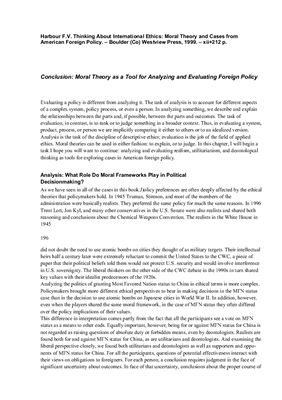– Boulder (Co) Westview Press, 1999. – xii+212 p.
Conclusion: Moral Theory as a Tool for Analyzing and Evaluating Foreign Policy
Evaluating a policy is different from analyzing it. The task of analysis is to account for different aspects of a complex system, policy process, or even a person. In analyzing something, we describe and explain the relationships between the parts and, if possible, between the parts and outcomes. The task of evaluation, in contrast, is to rank or to judge something in a broader context. Thus, in evaluating a system, product, process, or person we are implicitly comparing it either to others or to an idealized version. Analysis is the task of the discipline of descriptive ethics; evaluation is the job of the field of applied ethics. Moral theories can be used in either fashion: to explain, or to judge. In this chapter, I will begin a task I hope you will want to continue: analyzing and evaluating realism, utilitarianism, and deontolopcal thinking as tools for exploring cases in American foreign policy.
Conclusion: Moral Theory as a Tool for Analyzing and Evaluating Foreign Policy
Evaluating a policy is different from analyzing it. The task of analysis is to account for different aspects of a complex system, policy process, or even a person. In analyzing something, we describe and explain the relationships between the parts and, if possible, between the parts and outcomes. The task of evaluation, in contrast, is to rank or to judge something in a broader context. Thus, in evaluating a system, product, process, or person we are implicitly comparing it either to others or to an idealized version. Analysis is the task of the discipline of descriptive ethics; evaluation is the job of the field of applied ethics. Moral theories can be used in either fashion: to explain, or to judge. In this chapter, I will begin a task I hope you will want to continue: analyzing and evaluating realism, utilitarianism, and deontolopcal thinking as tools for exploring cases in American foreign policy.

